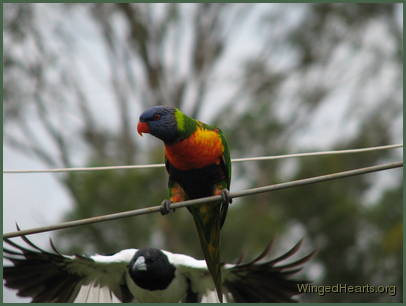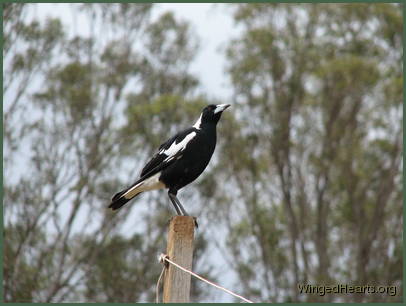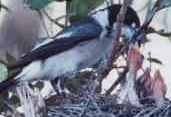Wild Birds - Gaining Their Trust and Becoming Friends - Part 1
There's definitely a list of do's and don'ts when it comes to talking to birds.  Wild birds have a big advantage over us, if they don't like what we're doing or saying they can fly away and avoid our company altogether. So in this case it is useful to understand the don'ts.
Wild birds have a big advantage over us, if they don't like what we're doing or saying they can fly away and avoid our company altogether. So in this case it is useful to understand the don'ts.
Birds scare easily - so the very first point is - Take care not to frighten the bird. This is surprisingly not as obvious as it seems. We humans get excited and enthusiastic and in our eagerness to make friends we sometimes don't give the birds enough time to get to know us. Friendship is a two-way street and we have give the bird the time and opportunity to observe us as well. In the beginning, the bird will scare easily. Their reflexes and inherent instinct is to escape at the very slightest movement in the shadow or flutter of one's sleeve or dress in the wind, or the vibration on the ground when we walk. This is not due to a direct response to us per se. But birds are tuned to avoiding danger from other predatory birds, cats and other animals that prey on them. Even when they know us well, there will be times when they will just fly off and you'll be left wondering what on earth you did to frighten them! Don't be offended when that happens, and it will happen many times.
Keep your voice normal or soft and speak gently and slowly. Take care not to shout loudly near them, or wave your arms too much if yo are only a short distance from them, or run towards them - even if it is to give them food or to greet them - these are all examples of things that we do when we get excited and forget that they will fly way from us. As they get to know you, the bolder birds will stay a bit longer before deciding whether to go or stay. But even when they know that they are completely safe with you, the shy birds will still fly off just to be 'on the safe side' from the perspective. Having said that you will find that once you have gained their trust and then if the occasion arises and you scold a naughty bird at top volume, they will all stay and listen including the shiest birds. They understand rules very well and they know when one of them is being admonished for breaking them and the other birds really appreciate you standing up for them.
Now that we have got that out of the way. We can focus on the Dos.
1. Start talking to them.
 You can call out to them gently and talk to them when putting out the water and food, or you can talk to them while they are eating and drinking. If you see a bird in the bush, or on the bank, or sitting on a post, you can just talk to the bird directly. If the bird is not used to talking to humans, the bird may retreat in shyness, fly off, or pretend to have not heard you. Do not feel discouraged or dissuaded by any of this. Just wait for the next opportunity and try again.
You can call out to them gently and talk to them when putting out the water and food, or you can talk to them while they are eating and drinking. If you see a bird in the bush, or on the bank, or sitting on a post, you can just talk to the bird directly. If the bird is not used to talking to humans, the bird may retreat in shyness, fly off, or pretend to have not heard you. Do not feel discouraged or dissuaded by any of this. Just wait for the next opportunity and try again.
As the bird becomes familiar with the sound of your voice, recognises your body language, gains confidence that you are not a threat, they will begin to relax and interact more positively. Your conversing with them is a new development for them too and they have to figure out how best to respond to your initiative. You can talk to them about a lot of things. They are actually very intelligent and excellent communicators. They spend their lives understanding the messages of other birds and other creatures in nature all of whom speak different languages. So they are much better at understanding other species than us humans. You can talk to them about the weather. Ask them if they are having a good day? Have they been busy keeping sentry duty for eagles, or hawks or cats? Do they like the sunshine, or the rain? How did they cope with the recent storm? Tell them that you hope they are not too hot and dry or cold and wet. Whatever is happening around you, is affecting their lives too. You will be surprised as to how much they do understand. In the beginning they will not know your words, but regardless, they will follow the tone and they will begin to recognise care,concern, and interest. 2. Watch Their Response: Wait for a reply for a short while, even if you don't get one, before returning indoors or changing your activity. What that does is signal to the birds that you are looking for a response from them. Do this regularly for a few days. Thank them when they look at you. 'Thank you' has a very powerful energy. It acknowledges the birds for who they are and tells them that you respect them and they matter to you. As the birds realise that your talking to them was not a one off freak event, they will start responding. One of them will come forward with perhaps another one or two in tow to call out to you. Then you can answer them and have a two way conversation. Thank them again for talking to you. Tomorrow we will look at more ways to build trust as this is the foundation of a long lasting friendship and opens the door to whole community of birds.
What can you talk about to a wild bird, you ask?
In the meantime, if you would like to know more about 23 Amazing Facts About Wild Bird Culture with true stories - click on this link and enter your details.
To read the earlier articles in this blog challenge click here.
Until tomorrow,
Cheers
Gitie

 del.icio.us
del.icio.us Digg
Digg Facebook
Facebook Google
Google Google+
Google+ LinkedIn
LinkedIn MySpace
MySpace Ping This!
Ping This! SlashDot
SlashDot StumbleUpon
StumbleUpon Twitter
Twitter Yahoo
Yahoo




Comments
We have a retreat in Uintah
We have a retreat in Uintah Mountains of Utah. We have lots of wild birds that come and go through the summer months. I've never thought about talking to them. I've read this blog post to one of my grands and we're going to do as you suggest when we return to our place of peace.
Thanks.
I'm glad to have found your
I'm glad to have found your post. I've been researching on few techniques on how to take care and train birds and luckily I found it. I've been wanting to have a pet bird, but because I'm too afraid of not being able to take care of them properly, I never had a pet bird or a pair of love birds until I'm ready to take care of them. Thanks for sharing your wonderful techniques on how to interact with these lovely creatures. I think, it's very important to know these strategies.
I don't believe in keeping pet birds.
I don't believe in keeping pet birds. A budgie flew beside our car for a kilometre once, just for the fun of it. No human can build a cage big enough to give them a good life.
Ron